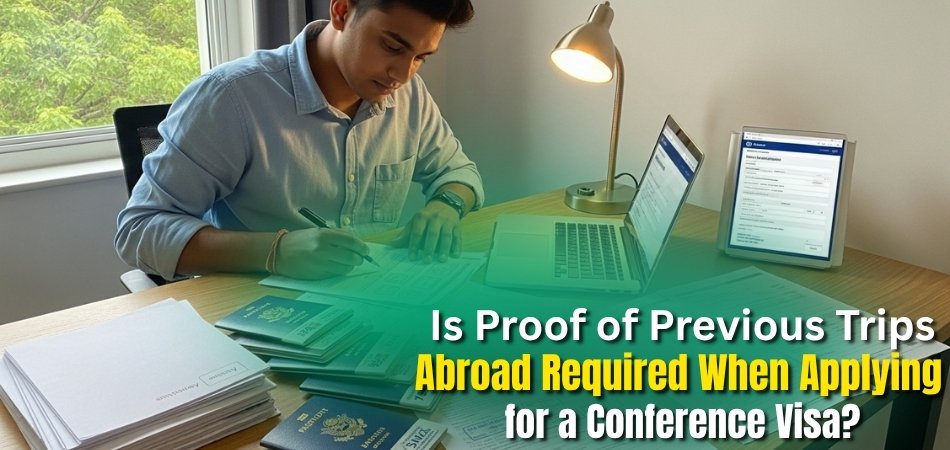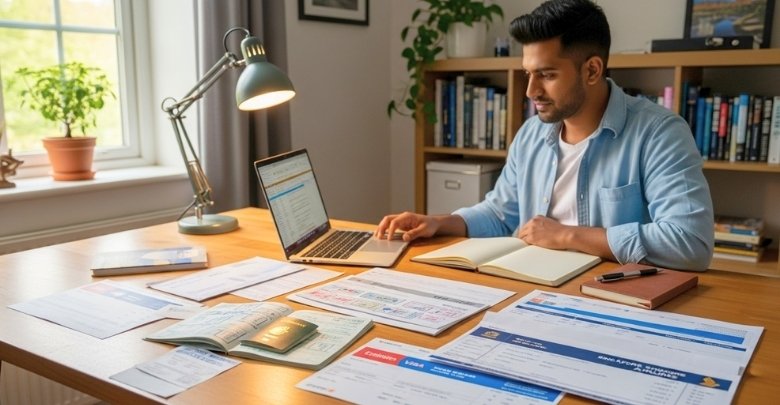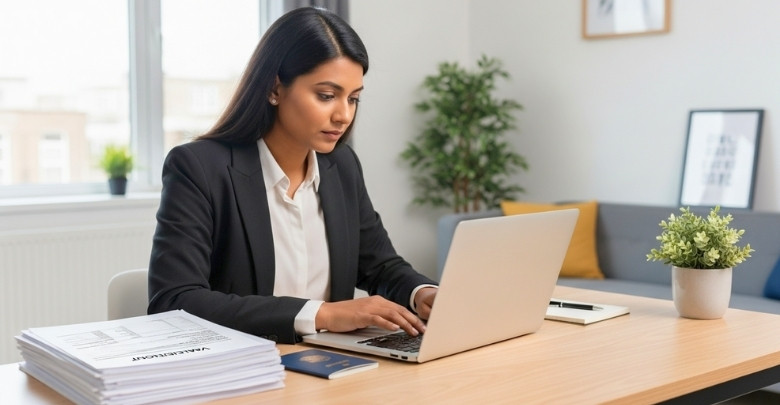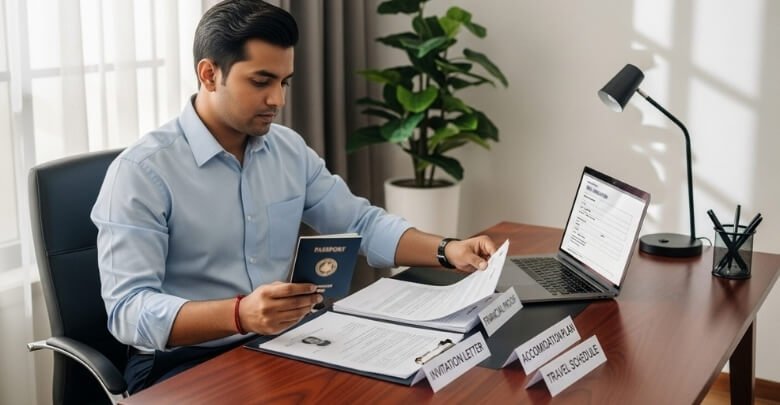Going abroad for a conference is exciting. You get to meet new people, learn fresh ideas, and grow in your career. But before that, you need to apply for a visa. This step can feel a little stressful, and many people wonder if they must show proof of past travel.
So, is proof of previous trips abroad required when applying for a conference visa?
No, not always. Some countries ask for it, others don’t. Still, adding it can make your application stronger because it shows that you travel and return on time. It’s not a rule, but it can help.
In the rest of this article, we’ll explain this in detail and share tips to guide you.
Is Proof of Previous Trips Abroad Required When Applying for a Conference Visa?
No, proof of past travel is not always required when applying for a conference visa. Many countries do not list it as a core requirement, but it can still be useful. Including it can help you show a solid travel record and your intent to return home. In many cases, this extra document adds credibility to your application even if it’s not mandatory. Below are the main ways past trips can support your visa application:
Role of Travel History
A strong travel history builds trust with visa officers and demonstrates responsible behavior during earlier international journeys. It can provide added confidence that you will respect the visa conditions and timeline. While not mandatory, submitting records of past trips helps present a stronger personal profile.
Showing your past trips also highlights that you travel for legitimate reasons such as work, study, or conferences. Officers reviewing your application may view your travel consistency as a sign of reliability. When missing, your application may still succeed, but could appear less convincing to strict authorities.
Variation in Country Policies
Different countries apply different standards when reviewing conference visa requests for short-term stays. Some consulates clearly request prior travel documents, while others only focus on mandatory items. Because rules vary widely, applicants should carefully check requirements published by official embassy websites.
Visa officers use country-specific policies to guide their evaluations, which makes local context very important. For instance, stricter countries may ask for records while lenient nations may completely ignore them. Understanding these variations can help you prepare the right documents tailored to your target country’s expectations.
Core Required Documents
Applicants must always prepare essential documents like passports, registration proofs, and confirmation letters from event organizers. These papers act as the foundation for any successful conference visa application, regardless of supporting items. Missing one of them usually leads to delays or even direct rejection from consular officers.
Proof of accommodation, return tickets, and enough funds are also critical for building a reliable application. These show that you can manage expenses and have plans to leave once the event concludes. While travel history may help, these basic requirements hold far greater importance across nearly every jurisdiction.
Financial Stability Proof
Financial evidence shows that you can support yourself throughout the conference visit. It ensures you have resources for food, accommodation, and local travel without burdening the host nation. Bank statements, sponsorship letters, or credit reports are common ways to display financial capacity to visa authorities.
This requirement matters because overstaying often links to applicants with insufficient financial security. A strong financial record reassures officials that your intent is genuine and temporary. Therefore, even without travel history, sound financial stability can often balance concerns during visa assessments.
Invitation and Registration Documents
Having a formal invitation letter from the conference organizers is often one of the most vital requirements. This confirms the legitimacy of your travel purpose and ties your visit directly to an official scheduled event. Consular officers weigh this evidence heavily since it connects applicants with verifiable organizations or institutions abroad.
Registration proofs are equally important because they highlight your commitment and actual involvement in the event. When paired with a return ticket, it assures officers that you plan to attend and then depart. Therefore, while proof of prior trips may help, official letters and registrations usually outweigh their importance.
Travel Intent and Return Assurance
Demonstrating intent to return home is essential for all applicants seeking conference visas. Return tickets serve as the strongest proof, showing clear plans after the event ends. Officials examine these details carefully to rule out possible overstays or misuse of visa permissions.
Travel records can enhance this factor because they reveal consistent return patterns after past trips. When combined with professional ties or family obligations, it builds a trustworthy narrative. For example, someone attending a conference in Canada with strong ties back home would demonstrate low overstay risks.
Consular Discretion
Even when documents are complete, final approval rests with the discretion of consular officers. They evaluate each case individually, taking into account the applicant’s overall background and supporting evidence. In some cases, even strong files may face extra questions or additional document requests.
This discretion means that submitting proof of past trips could provide an advantage. It may help ease doubts in borderline cases where the officer remains unsure. Since applicants cannot predict discretion outcomes, including travel records remains a smart optional step.
Supporting Role of Travel Proof
While not mandatory, proof of previous trips works as a secondary supporting factor. It helps create an impression of responsibility, especially for first-time conference travelers. Some applicants without strong financial or professional ties might particularly benefit from including it.
It can also serve as backup evidence when other parts of the application are weaker. This flexibility makes travel history a useful, though not essential, part of the file. Therefore, applicants should always consider submitting it whenever available to maximize their chances.
What Types of Evidence Count as Proof of Previous Trips Abroad?
Travelers often wonder what counts as valid proof of their previous international trips when applying for a visa. Consular officers accept many types of evidence, and each plays a role in showing genuine travel intent. Collecting these documents helps create a stronger application, especially when supporting other required papers. Let’s look at the most common forms of acceptable proof.
- Stamped Passport Pages: Visa stamps on passport pages confirm exact entry and exit dates from different countries. These pages reflect consistent travel records clearly.
- Old Visa Stickers: Past visa stickers show that you were granted entry for travel before. They also confirm the nature of those visits.
- Boarding Pass Copies: Saved boarding passes give details of flights you actually took. They highlight your departure and arrival records on specific dates.
- Hotel Booking Slips: Receipts or booking confirmations from hotels display the places you stayed. These prove genuine travel and support your trip history evidence.
- Travel Itinerary Printouts: Itinerary copies from airlines or agencies outline your route. They help officers see that trips were real and properly organized.
- Immigration Entry Records: Official entry cards or slips collected at airports serve as strong evidence. They prove that authorities recorded your entry into another country.
- Conference or Event Proofs: Participation certificates or badges confirm your visit’s professional purpose. Such documents support credibility, especially for academic, business, or cultural travel.
- Ticket Purchase Receipts: Airline or train ticket receipts highlight that you paid for your travel. This shows intent and strengthens the overall record.
How to Obtain and Format Travel History Documents for Visa?
When preparing a visa application, travel history documents can add credibility and help build trust. Organizing them properly shows transparency and reduces unnecessary delays. Here are some clear methods for collecting, arranging, and presenting them.
Collect Relevant Travel Papers
- Previous passports from the last ten years should be gathered because they contain entries from multiple earlier trips. They provide reliable travel evidence.
- Visas, whether expired, cancelled, or valid, give officers proof of your earlier authorizations. They show consistency in international travel experiences.
- Immigration entry or exit stamps confirm official records of border crossing. These markings highlight dates and match details from other documents.
Scan and Create Copies
- Make clear color scans of passport pages with personal information, visas, and stamps. Ensure all numbers and dates remain legible.
- Copies must include every necessary stamp to avoid missing travel evidence. Consular officers expect applicants to provide a complete record.
- Proper scanning also prevents rejection caused by unreadable images. Legibility plays a major role in building application credibility.
Format Travel Records
- Arrange collected papers chronologically with the newest trip first. Order shows an accurate timeline and avoids confusion during review.
- Add a summary sheet listing each trip destination, travel dates, and reason. This document helps officers assess the purpose easily.
- Label every copy clearly to correspond with the summary. Matching references reduces confusion and improves the reviewer’s overall experience.
Prepare Final Submission
- Translate documents into the requested language when necessary. Certified translations assure accuracy and increase acceptance chances significantly.
- Combine scans into one PDF file with a simple table of contents. Organized files present information more professionally and clearly.
- Submit your travel history with required documents like a passport, financial proof, and an invitation. These strengthen applications, including possibility of US conference visa for first time.
Will Lack of Prior Travel Hurt Your Conference Visa Chances?
No, lacking past international travel does not always hurt your chances of getting a conference visa. Many applicants succeed without showing travel history. What matters more is how strong and complete the other required documents are. Let’s explore the factors that influence outcomes.
Strength of Core Documents
A valid passport is always essential because it establishes identity and nationality for any applicant. Invitation letters confirm the conference is legitimate. Registration proofs demonstrate clear intent, which strengthens your overall purpose. Missing these documents can harm chances more than lacking past travel.
Financial Capability Evidence
Consular officers want to see proof that you can cover travel expenses, accommodation, and daily costs. Bank statements usually provide this assurance. Sponsorship letters can also show financial support for the trip. Solid financial evidence often balances the absence of previous travel history.
Purpose of Visit
Your visit must be clearly defined through invitation and registration. A strong explanation builds confidence in your intent. Ambiguous purposes raise doubts with officers reviewing files. Clear documentation often matters more than demonstrating past international travel records.
Ties to Home Country
Family obligations, job commitments, or property ownership prove strong ties. These ties reassure authorities that you plan to return after attending. Evidence of community involvement can also help. Applicants with no travel history but strong ties often succeed.
Consular Officer Discretion
Visa officers evaluate the entire file individually. Decisions can vary depending on the officer’s judgment. Good documents, strong purpose, and clear ties help. Lack of prior trips usually matters less if everything else appears reliable.
How to Strengthen Your Application if You Have Limited Travel History?
Many people worry about visa approval when they don’t have much travel experience. Fortunately, there are several practical ways to strengthen an application. By highlighting intent, documents, and ties, you can balance the absence of an extensive travel record. Here are the details:
Write a Detailed Cover Letter
- A strong cover letter should explain the conference’s purpose and emphasize the intent to return home. Officers prefer seeing clarity and honesty.
- Adding personal details like role, career goals, and reasons for attending builds authenticity. This document helps fill potential travel gaps.
Show Academic or Work Proofs
- Students can provide academic records and enrollment certificates. These show long-term commitments and clear reasons for returning after travel.
- Professionals should add reference letters, certificates, or leave approvals from employers. These papers confirm responsibilities and strong local ties.
Provide Property or Lease Agreements
- Property ownership establishes a physical tie to your home country. Such documents reassure authorities about your strong local connections.
- Lease agreements can also demonstrate stable living conditions. Even rented housing reflects responsibility and reduces overstay concerns significantly.
Add Conference-Related Documents
- Official invitations, registration slips, and schedules highlight the legitimacy of your trip. They prove your visit has a clear purpose.
- Combining these papers with financial proofs enhances credibility. Officers view these as stronger than travel history alone.
Highlight Social and Community Involvement
- Membership in local organizations, volunteer work, or community events demonstrates dedication. These activities help confirm your intent to return.
- Submitting certificates or letters from leaders adds reliability. Officials value applicants with proven community bonds and established social roots.
Submit Old Passports and Visas
- Even if stamps are few, old passports still matter. They reveal earlier attempts and verify any previous international movements.
- Expired visas or travel permits demonstrate granted permissions. Providing them boosts the impression of responsibility and positive recordkeeping.
Mention Short or Nearby Trips
- Including details of limited foreign trips builds a starting history. Responsible short visits strengthen credibility despite minimal records.
- Even regional travels reflect good behavior. Officers may see such patterns as valuable progress toward bigger travel experiences.
Plan for Future Travel Growth
- Showing plans for gradual travel helps officers trust your intentions. It signals realistic steps toward expanding international exposure gradually.
- Begin with nearby visa-friendly countries first. These experiences create patterns that support stronger applications for future long-distance events.
Tips for Preparing a Strong Conference Visa Application
Getting ready for a conference visa can feel a little confusing at first. There are many papers and steps involved. Sometimes people get stressed because they don’t know what matters the most. With the right tips, the process becomes easier.
Passport Ready
Your passport is the first thing officers check, so make sure it’s valid for at least six months. Always check if it has enough blank pages for new stamps. If it’s almost expired, renew it before applying. A neat and updated passport leaves a good impression.
Invitation Letter
An official invitation letter from the conference organizer is one of the strongest documents. It shows the event is real and you are expected there. Keep the original copy if possible, but a scanned copy also works. Make sure names and details match your passport.
Financial Proof
Visa officers want to see that you can pay for your travel, stay, and food. Bank statements or a sponsor letter can be good proof. Showing you have enough funds helps build trust. Never submit fake papers, as that can get you banned.
Accommodation Plan
Hotels or stay confirmations make your application look complete. Even a simple booking slip is enough to show your arrangements. Officers like to know you have a safe place to stay. If you are staying with friends, get a letter from them.
Travel Schedule
A return ticket is very important because it shows you plan to go back home after the event. Add a short travel schedule with your arrival and departure dates. You can also include conference timings if available. This makes your file look very organized.
Ties at Home
Visa officers want to see proof that you will come back home. Documents like school records, job letters, or family ties help. If you own property, include those papers as well. These ties reduce the risk of rejection.
Extra Preparation
Sometimes you might face delays or other issues, like dealing with late visa approvals, that can affect your plans. Keep backup documents like extra IDs or old passports ready. Double-check every paper before submission to avoid mistakes. Being careful with details saves a lot of trouble.
FAQs About Conference Visa Requirements for Travel History
Applying for a conference visa can raise many small but important questions. Proof of previous trips is one area that often confuses applicants. Here are some common queries people ask, along with clear and simple answers.
Does Every Country Ask for Proof of Travel?
No, not every country requires proof of past travel for conference visas. Some countries emphasize financial proof, invitations, and ties instead. Always check the specific embassy rules, because requirements vary widely and change depending on country policies and regulations.
Can I Submit Digital Copies Instead of Originals?
Yes, many embassies accept scanned or digital copies of travel documents, but originals may be requested later. Always make clear, legible copies. Digital files are often used when applications are submitted online or through authorized visa centers worldwide.
Will Lack of Travel History Reduce My Approval Chances?
Not necessarily, as strong core documents like invitation letters, financial proof, and return tickets matter more. Travel history is only a supporting factor. Authorities mainly look for a genuine purpose, strong ties to home, and complete application documentation overall.
Do Old Passports Count as Travel Proof?
Yes, old passports containing expired visas or stamps are valid evidence of past trips. Officers often appreciate applicants who keep older documents. Submitting them shows responsible recordkeeping and helps strengthen the overall credibility of your conference visa application file.
Is Travel Proof Needed for First-Time Applicants?
First-time applicants are not automatically rejected for lacking travel records. Strong home ties and proper financial documents usually balance the file. Visa officers understand everyone starts somewhere, so honesty and accurate papers matter far more during their evaluations.
Can Short Regional Trips Help My Application?
Yes, even short trips to nearby countries can strengthen your visa application. They show responsible travel and timely returns. Officers may view regional visits as early evidence of good travel behavior, which supports your credibility when applying for conferences.
Should I Translate My Travel Documents?
Yes, if documents are not in the embassy’s required language, certified translations are necessary. Clear translations avoid confusion and delays. Submitting untranslated files may result in rejection or extra requests, so always prepare them according to the official guidelines provided.
How Should I Organize My Travel Proof?
Travel documents should be arranged chronologically with the latest trip first. Include a simple summary sheet with destinations, dates, and purpose. Organized files make review easier for visa officers and create a stronger impression of applicant responsibility overall.
Wrap Up
Getting a visa for a conference can feel stressful, but it becomes easier when you prepare the right way. Key papers like your passport, invitation, money proof, and return ticket are always the most important.
Many people ask, is proof of previous trips abroad required when applying for a conference visa? The truth is, it’s not always needed, but if you have it, it can help. Even without travel history, you can still get approval with strong home ties and clear reasons. Keep everything simple, honest, and well arranged, and your chances of success will be higher.









